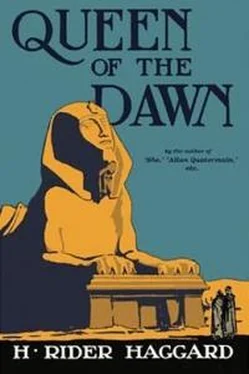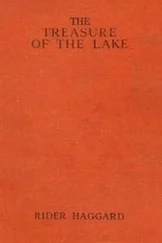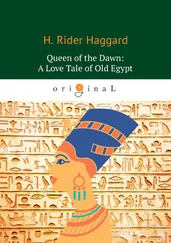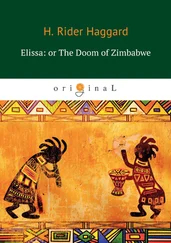"Why not, Pharaoh?" answered Khian, laughing, "seeing that, if all goes well, it is your purpose to make of me a very private person, for then I who this morning was the heir apparent, or so it pleased you to say, shall be but one of many king's sons. If that chances I would ask whether I who shall have lost much may retain my private estates and revenues that have come to me through my mother or by the endowment of your Majesty? For I who do not greatly care for crowns could wish to remain rich with means to live at ease and follow those pursuits I love."
"That is sworn to you, Khian, here and now and upon my royal word. Let it be recorded!"
"I thank the King, and now by permission I will withdraw myself to talk with that wounded man before he dies, since perhaps he can tell me much that may be useful upon this business."
Then the Prince Khian prostrated himself and went.
When he had watched him go, King Apepi thought to himself:
Surely this young man has a great heart. Few would not have winced beneath such a blow, unless indeed they planned treachery, which Khian could never do. Almost am I grieved. Yet it must be so. If that royal maiden lives, I will wed her and swear the throne to her children, for thus only can I and Egypt sleep in peace. Then he said aloud:
"The Council is ended and woe to him that betrays its secrets, for he shall be thrown to the lions."
Chapter VIII
The Scribe Rasa
Within thirty days of the holding of this Council, a messenger appeared on what was acknowledged to be the frontier of the Holy Ground that was marked by the highest point to which the Nile rose in times of flood, and called to one who was working in the field that he had a writing which he prayed him to deliver to the Prophet of the Order of the Dawn.
The man came and, staring at the messenger stupidly, asked:
"What is the Order of the Dawn and who is its prophet?"
"Perchance, Friend, you might make inquiries," said the messenger, handing him the roll and with it no small present. "Meanwhile I, who may always be found at dawn or sunset seated at my prayers in yonder group of palms, will bide here and await the answer."
The farmer, for such he seemed to be, scratched his head and, taking the roll and the present, said that he would try to serve one so generous, though he knew not of whom to ask concerning this order and its prophet.
On the following day at sunset he appeared again and handed to the messenger another roll which he declared he had been charged by some person unknown to give to him for delivery to the King Apepi at his Court at Tanis. The messenger, mocking this peasant, said that he had never heard of King Apepi and did not know where Tanis might be; still out of kindness of heart, he would try to discover and make due delivery of the roll after which the two smiled at each other and departed.
Some days later this writing was read to Apepi by his private scribe. It ran thus:
"In the name of that Spirit who rules the world, and of his servant Osiris, god of the dead, greeting to Apepi, King of the Shepherds, now dwelling at the city of Tanis in Lower Egypt.
"Know, O King Apepi, that we, Roy the Prophet and the Council of the Order of the Dawn, who sit in the shadows of the ancient pyramids built long ago by certain kings of Egypt, once members of our order, to serve as tombs for their bodies and to be monuments to their greatness on which all eyes might gaze till the end of the world; we who from age to age drink of the wisdom of the Sphinx, the Terror of the desert, have received your message and given it consideration. Know, O King, that although of late we have suffered grievous wrong at the hands of some who seem to have been your officers, for which wrong those unhappy ones paid with their lives, as all must do who attempt to violate our sanctity and to peer into our secrets; in obedience to the precepts of our Order, we forgive that wrong and having put it aside as a matter of small account, we will receive the ambassador whom you desire to send to us to discuss matters of which you do not reveal the purport. Know, O King, further, that this ambassador, whoever he may be, must come alone, for it is contrary to our rules to admit more than one stranger beyond the borders of the Holy Ground. If after learning this it be still your pleasure to send that ambassador, let him appear before the next full moon in the same grove of palms where this roll was delivered to your messenger. Here one of those who serve us will find him and guide him to where we are, nor shall he suffer any harm at our hands."
When Apepi had heard this letter, he sent for the Prince Khian and asked him privately whether still he dared to adventure himself unaccompanied among the people of the Order of the Dawn and in a place which all men swore was haunted.
"Why not, Father?" asked Khian. "If mischief is meant against me, an ambassador's guard would be no protection, nor are ghosts and spirits to be frightened away by numbers. If I go at all I would as soon go alone as in company. Also it is plain that thus only can this embassy be carried out, because yonder Brotherhood will not receive more than a single man."
"As it pleases you, Son," replied Apepi. "Go now and make ready. To–morrow the writing shall be delivered to you by the Vizier together with my instructions; also a guard will be waiting to conduct you to the place appointed by this prophet. Go and return in safety, remembering our bargain and bringing this maiden with you in charge of women of her own people, if so it may be, for thus shall you earn my favour."
"I go," said Khian, "to return, or perchance not to return, as the gods may direct."
So, everything having been made ready and the roll containing the offers and the threats of King Apepi given into his keeping, together with offerings of gold for the gods of the Children of the Dawn and presents of jewels for the Princess Nefra, if it should be proved that she was the wondrous maiden who dwelt among them, Khian departed. Yet he did not travel as the Prince, but rather as a Scribe of the Court, Rasa by name, whom it had pleased the King to choose to be his envoy upon a certain business. Leaving Tanis so secretly that few discovered he had gone, he sailed up Nile in a ship whose sailors had never seen him, and although they had orders to obey him in everything, took him to be what he said he was, a messenger, Rasa by name, travelling upon the royal business. Even the guard that accompanied him, six in number, were soldiers from a distant city who had never looked upon his face.
His journey ended, he reached the landing place in the afternoon upon the day appointed and was escorted by the soldiers who bore the gold and other gifts, also his travelling gear, to the grove of palms which the messenger had described, as to which there could be no mistake, for no other was in sight. Here he dismissed the guard, who left him doubtfully and yet were glad to go before evening came, for like all Egypt they believed this place to be haunted by the ghosts of the mighty dead, also by the Spirit of the Pyramids whose eyes drove men to madness.
"Now, as we are ordered by Anath the Vizier," said the captain of the guard, "we and the ship in which you have travelled, my Lord Rasa, depart to Memphis where we may be found when we are summoned, though we are not sure that you will ever need a ship again."
"Why not, Captain?" asked Khian, or Rasa.
"Because this place has an evil repute, my Lord Rasa, and it is said that no stranger who crosses yonder belt of sand ever returns."
"If so, what happens to him, Captain?"
"We do not know, but it is reported that he is walled up in a tomb and left to perish there. Or, if he escapes this fate and is as young and well–favoured as you are, perchance he meets the beauteous Spirit of the Pyramids who wanders about in the moonlight, and becomes her lover."
Читать дальше
Конец ознакомительного отрывка
Купить книгу












